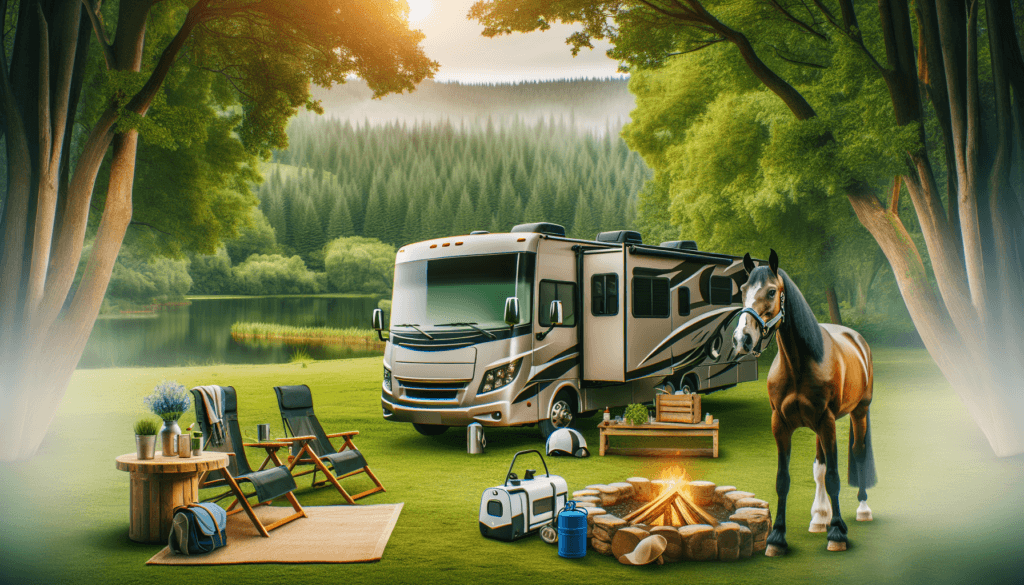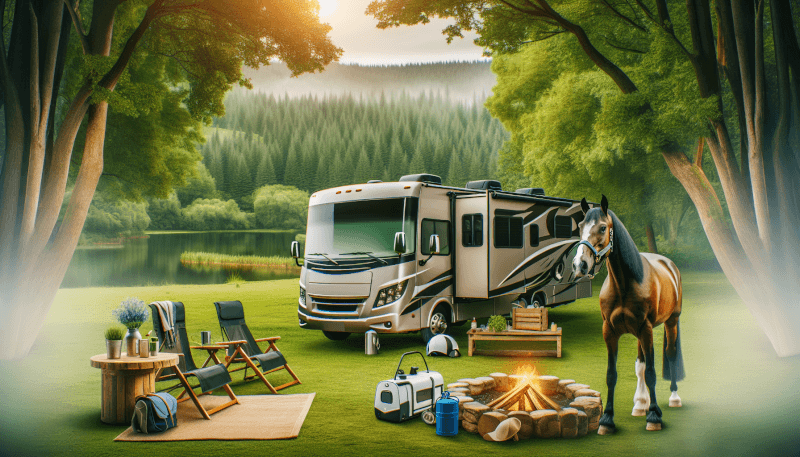Are you a horse enthusiast looking to embark on a thrilling equestrian adventure? Look no further than RV camping with horses! This unique and exciting experience allows you to combine your love for horses with the freedom and convenience of RV travel. In this article, we will provide you with valuable tips and advice on how to make the most out of your RV camping trip with your equine companions. From finding horse-friendly campsites to ensuring the safety and comfort of your horses on the road, we’ve got you covered. So saddle up and get ready for an unforgettable equestrian adventure!
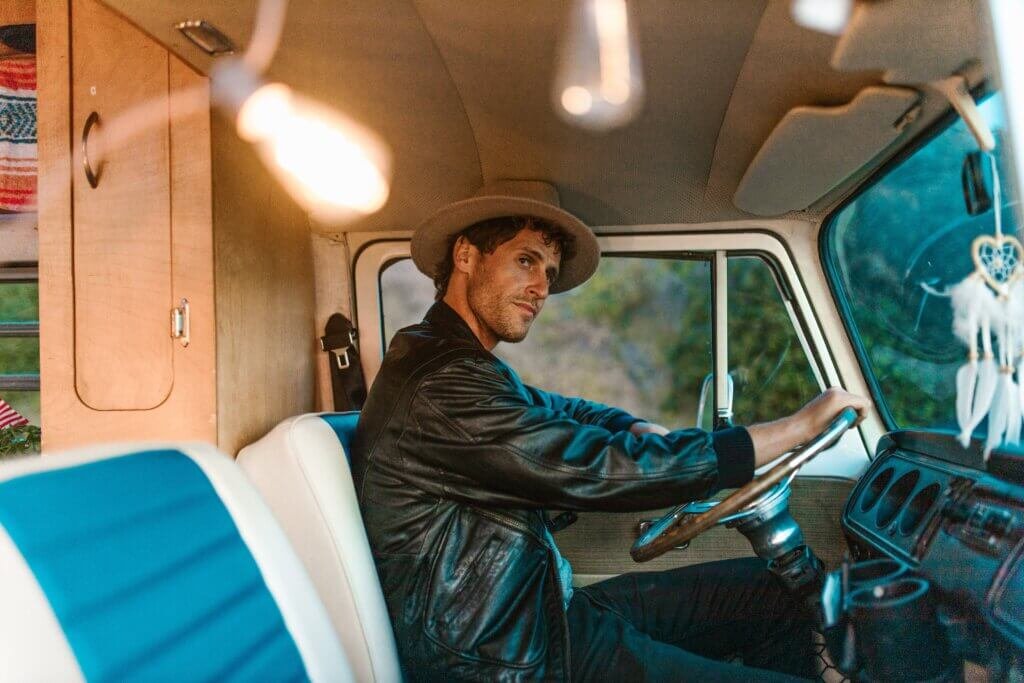
Essential Equipment for RV Camping with Horses
Horse trailer
When embarking on an RV camping trip with your horses, a reliable and well-equipped horse trailer is an absolute must. Choose a trailer that not only accommodates the size and number of your horses but also provides a safe and comfortable environment for them during transportation. Features such as sturdy flooring, sufficient ventilation, and proper suspension will ensure a smooth and secure ride for your equine companions.
Portable corral
Creating a safe and enclosed space for your horses to graze and relax is essential while RV camping. Portable corrals offer the convenience of easy setup and dismantling, allowing you to provide a comfortable and secure area for your horses to enjoy some downtime. Look for corrals made from durable materials, such as high-quality mesh or panels, that can withstand the elements and keep your horses safely contained.
Tack and grooming supplies
To ensure the well-being of your horses during your RV camping adventure, it’s important to have all the necessary tack and grooming supplies on hand. This includes bridles, saddles, halters, lead ropes, brushes, hoof picks, and grooming tools. Keeping your horses clean and well-groomed not only contributes to their overall health but also enhances their appearance.
Hay and feed storage
Proper storage of hay and feed is crucial to maintain the nutritional needs of your horses during your RV camping trip. Invest in high-quality storage bins or bags that protect hay from moisture, pests, and spoilage. Additionally, make sure to pack enough hay and feed to last the duration of your journey, taking into consideration the number of horses and their dietary requirements.
Water supply and watering system
Access to clean and fresh water is fundamental for your horses’ well-being. Before setting off on your RV camping adventure, ensure that you have a reliable water supply onboard your vehicle. Consider carrying water in large containers or investing in portable water tanks that can be easily filled and connected to your RV’s plumbing system. A watering system, like automatic waterers or buckets with secure attachments, will ensure that your horses stay properly hydrated throughout the trip.
Choosing the Right RV for Horse Camping
Consider the weight and size of your horses
When selecting an RV for horse camping, it’s crucial to consider the weight and size of your horses. Larger horses will require more space, both horizontally and vertically, to ensure their comfort and safety during transportation. Additionally, the weight of your horses will affect the towing capacity of your RV, so it’s essential to choose a vehicle that can safely handle the load.
Look for RVs with horse-friendly features
Some RV manufacturers design their vehicles with equestrian enthusiasts in mind. Look for RVs that offer horse-friendly features, such as built-in horse stalls, adjustable dividers, and padded walls to protect your horses during travel. These features not only enhance the safety and comfort of your horses but also make your RV camping experience more convenient and enjoyable.
Determine the necessary living space for both horses and humans
Horse camping requires careful consideration of both human and equine living space requirements. While ensuring that your horses have ample room to move and rest comfortably, don’t forget to prioritize your own living space as well. Choose an RV with sufficient sleeping quarters, living areas, and kitchen facilities to accommodate your needs.
Consider fuel efficiency and towing capacity
Efficient fuel consumption and towing capacity are imperative when selecting an RV for horse camping. Consider the distance you plan to travel and the terrain you’ll encounter during your journey. Opt for an RV that offers good fuel efficiency to minimize costs and reduce your environmental impact. Additionally, ensure that the RV’s towing capacity is sufficient to handle the weight of your horses and horse trailer.
Ensure proper ventilation and airflow for horse comfort
Proper ventilation and airflow are vital for the well-being of your horses during RV camping. Look for RVs with ample windows, vents, or fans in the horse compartment, as well as adjustable airflow options that allow you to regulate the interior climate. Adequate ventilation will ensure proper air circulation, reducing the risk of respiratory issues and keeping your horses comfortable throughout the trip.
Selecting Horse-Friendly RV Campgrounds
Check for horse-friendly amenities
When choosing RV campgrounds for horse camping, be sure to check for horse-friendly amenities. Look for campgrounds that offer designated horse areas, including hitching posts, watering stations, and manure disposal facilities. Access to amenities like horse wash racks or areas to exercise your horses can enhance your camping experience and provide conveniences for your equine companions.
Consider the size and layout of campsites
The size and layout of campsites are crucial considerations to ensure a comfortable stay for both you and your horses. Look for campsites that provide adequate space for your RV, horse trailer, and portable corrals. Check if the site offers level terrain to set up your horse resting area without any safety hazards. Additionally, consider the proximity of neighboring campsites to minimize disturbances and promote a serene environment for you and your horses.
Look for nearby riding trails or equestrian facilities
One of the joys of horse camping is the opportunity to explore new trails and enjoy the beauty of nature with your equine companions. When selecting RV campgrounds, look for those that offer nearby riding trails or have equestrian facilities within a reasonable distance. Taking advantage of well-maintained trails or the opportunity to participate in equestrian events can add an extra layer of adventure and excitement to your horse camping experience.
Check for available horse corrals or stables
If you prefer to give your horses a break from portable corrals, consider RV campgrounds that offer on-site horse corrals or stables. These facilities provide a secure and convenient place to house your horses while you explore the campground or participate in other activities. This can save you the hassle of setting up and dismantling portable corrals at each location, making your horse camping experience more relaxed and enjoyable.
Ensure access to water and hay for horses
Horses require access to water and hay to meet their basic needs while camping. Look for campgrounds that provide easy access to water sources, such as watering stations or troughs. Additionally, consider whether the campground allows for convenient storage and disposal of hay. Having onsite facilities or nearby options for purchasing hay will keep your horses well-fed and hydrated throughout your RV camping adventure.
Preparing Your Horses for RV Camping
Get your horses accustomed to trailer travel
Before embarking on your RV camping trip, it’s important to get your horses accustomed to trailer travel. Gradually introduce your horses to the trailer by allowing them to explore the space and become comfortable with its presence. Practice loading and unloading them in a calm and patient manner, rewarding them with treats or praise. Gradually increase the duration of trailer journeys to build your horses’ confidence and reduce travel-related stress.
Ensure horses are up to date on vaccinations and health check-ups
The health and well-being of your horses should be a top priority when planning for RV camping. Consult your veterinarian to ensure that your horses are up to date on vaccinations and necessary health check-ups. This will help protect your horses from infectious diseases and provide peace of mind during your trip. Additionally, keep a copy of your horses’ vaccination records and important contact information for emergency veterinary services while on the road.
Pack essential horse care supplies
To ensure you have everything you need to take care of your horses during your RV camping adventure, pack essential horse care supplies. This includes medication, first aid supplies, fly spray, hoof care products, and any specialized equipment specific to your horses’ needs. Having these items readily available will allow you to address minor ailments or injuries promptly and provide the necessary care and comfort to your horses.
Check the condition of your horse’s hooves
Before setting off on your RV camping trip, it’s crucial to have your horse’s hooves checked by a professional farrier. Regular hoof care is essential to prevent lameness and discomfort while traveling. Ensure that your horses’ hooves are properly trimmed, balanced, and free from any signs of infection or injury. Regular inspections throughout your journey will help identify and address any hoof-related issues that may arise.
Practice setting up and dismantling portable corrals
To streamline the process of setting up and dismantling portable corrals at each campsite, it’s essential to have prior experience and practice. Before your RV camping trip, take the time to familiarize yourself with the steps involved in setting up and dismantling your portable corrals. This will not only save you time and frustration but also ensure that your horses’ temporary enclosure is secure and comfortable.
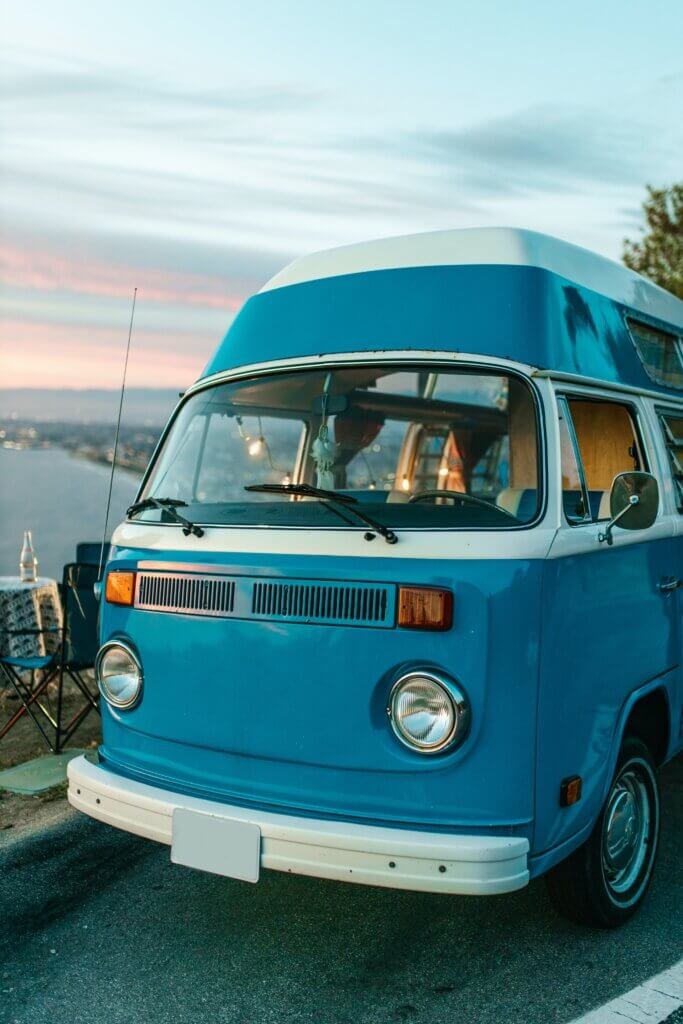
Safe and Efficient Horse Loading and Unloading
Train your horses to load and unload calmly
Loading and unloading horses from a trailer can be a potentially stressful situation if not handled properly. Prioritize training your horses to load and unload calmly and confidently before your RV camping adventure. Use positive reinforcement, such as treats or praise, to reward your horses for their cooperation and create a positive association with trailer travel. Patience, consistency, and gentle handling techniques will help build your horses’ trust and confidence in the loading and unloading process.
Use proper loading and unloading techniques
Proper loading and unloading techniques are essential to ensure both the safety of your horses and the people handling them. When loading, take the time to align the trailer properly, raise the ramp or open the door, and invite your horses to enter willingly. Ensure that the loading area is well-lit and free from any hazards that may spook or harm your horses. During unloading, allow your horses to exit at their own pace, providing reassurance and encouragement as needed.
Ensure the safety of both horses and handlers
Safety should always be a top priority when loading and unloading horses from a trailer. Make sure that all members of your RV camping party understand basic safety protocols and procedures. This includes wearing appropriate footwear, using caution when handling horses, and maintaining clear communication among handlers. It’s also essential to have a designated handler and spotter to ensure the safe movement of horses in and out of the trailer.
Observe the weight and balance of the horse trailer
Proper weight distribution and balance within the horse trailer are crucial for safe and comfortable transportation. Familiarize yourself with the weight limits and recommendations for your specific horse trailer and avoid exceeding these limits. Ensure that the weight of your horses, as well as any additional equipment or supplies, is evenly distributed to minimize the risk of swaying or tipping while on the road. Regularly inspect the trailer’s suspension, tires, and brakes to maintain optimal safety.
Take breaks during long journeys
Long journeys can be physically and mentally exhausting for both horses and humans. It’s important to plan regular breaks during your RV camping trip to allow your horses to stretch their legs, rest, and have access to water. Breaks also provide an opportunity for you to assess your horses’ well-being, address any concerns or issues, and make adjustments as necessary. Be mindful of the temperature and weather conditions, as well as the overall fatigue level of your horses, when planning breaks.
Setting Up a Horse-Friendly Campsite
Choose a level and spacious area for horse camping
Selecting the right location to set up your horse campsite is essential for the comfort and safety of your horses. Choose a level and spacious area that allows your horses to move around freely without the risk of tripping or stumbling. Avoid areas with excessive mud, rocks, or uneven terrain that may pose a hazard to both horses and handlers.
Set up portable corrals or electric fences
Once you’ve chosen a suitable campsite, it’s time to set up your portable corrals or electric fences. Follow the manufacturer’s instructions to ensure a secure and stable enclosure for your horses. Take into consideration the size and number of your horses, as well as their need for space to graze and rest comfortably. Regularly inspect the corral or fence for any signs of wear or damage and make repairs as needed.
Create a comfortable horse resting area
In addition to setting up portable corrals, it’s essential to create a comfortable resting area for your horses. Provide soft bedding, such as straw or shavings, to cushion the ground and provide a comfortable surface for your horses to lie down. Ensure that the resting area is free from debris and hazards that may cause injury. Offering shade, such as a portable shelter or trees, will also provide relief from the sun and enhance your horses’ comfort.
Provide access to water and shade for horses
Hydration and protection from the elements are paramount to your horses’ well-being while camping. Ensure that your horse campsite provides access to clean and fresh water throughout your stay. Portable water troughs or buckets can be used to provide a constant supply of water for your horses. Additionally, provide ample shade to protect your horses from direct sunlight and excessive heat. Portable shades, awnings, or trees can provide the necessary relief from the sun’s rays.
Keep the campsite clean and free of hazards
Maintaining a clean and hazard-free campsite is not only important for your own well-being but also for the health and safety of your horses. Regularly clean the area around the portable corrals to remove manure and debris. Dispose of waste responsibly, following campground guidelines or local regulations. Keep an eye out for any hazards, such as sharp objects, toxic plants, or loose wires, and promptly address them to prevent accidents or injury to your horses.

Maintaining Horse Health and Welfare on the Road
Ensure a balanced diet and hydration for horses
Providing your horses with a balanced diet and sufficient hydration is essential for their health and welfare while on the road. Ensure that their diet consists of high-quality hay or pasture, supplemented with appropriate grains or concentrates. Monitor their water intake closely, encouraging them to drink regularly to prevent dehydration. Adjust their feeding schedule as needed to accommodate the demands of travel and changes in routine.
Regularly check for signs of illness or discomfort
Vigilance is key when maintaining your horses’ health on the road. Regularly check your horses for any signs of illness, injury, or discomfort. Look out for changes in appetite, behavior, or bowel movements that may indicate an underlying health issue. Pay attention to their overall demeanor and physical condition, taking note of any lameness, swelling, or abnormalities. If you notice any concerns, consult a veterinarian promptly.
Provide exercise and mental stimulation for horses
Traveling in an RV may limit the amount of exercise and mental stimulation your horses receive compared to their regular routine. It’s crucial to provide opportunities for your horses to move and engage their minds while on the road. Schedule regular exercise sessions, such as hand-walking or lunging, to keep your horses physically active. Provide environmental enrichment, such as turnout in a safe area or toys for mental stimulation, to prevent boredom or frustration.
Maintain a schedule for feeding and grooming
Consistency is essential to maintaining your horses’ well-being while on the road. Establish a consistent schedule for feeding, grooming, and other care routines to provide stability and reduce stress. Try to stick to their regular feeding times and groom them at a time when they are most relaxed. Maintaining a routine will promote a sense of familiarity and normalcy for your horses, contributing to their overall comfort and happiness.
Make necessary adjustments for temperature changes
As you travel to different regions, you’ll encounter a variety of weather conditions and temperature changes. It’s important to make necessary adjustments to ensure your horses’ comfort and well-being. Monitor the temperature and weather forecast, and provide appropriate protection or adjustments to their environment. This may include using blankets or sheets in colder temperatures, providing additional shade and ventilation in hotter climates, or adjusting feeding routines to accommodate changes in appetite.
Trail Riding and Exploring with Horses
Plan and map out your trail riding routes
Part of the joy of RV camping with horses is the opportunity to explore new trails and scenic routes. Before setting off, take the time to plan and map out your trail riding routes. Research local equestrian maps, trail guides, or consult with other experienced horse campers or local riders for recommendations. Consider the difficulty level of the trails, the time required, and any restrictions or permits necessary for trail access to ensure a safe and enjoyable riding experience.
Familiarize yourself with local trail regulations and restrictions
When trail riding with your horses, it’s essential to familiarize yourself with local trail regulations and restrictions. Respect any rules regarding trail usage, such as designated horse-only trails or specific riding hours. Be aware of any required permits or passes that may be necessary to access certain trails or trail systems. Understanding and adhering to these regulations will ensure that you have a positive experience while minimizing your impact on the environment and other trail users.
Take precautions to prevent trail injuries
Safety should always be a priority when trail riding with your horses. Take precautionary measures to prevent trail injuries, such as wearing appropriate safety gear, including helmets and riding boots. Consider using protective leg wraps or boots for your horses to minimize the risk of cuts, scrapes, or injuries from trail obstacles. Maintain a steady pace, especially in unfamiliar terrain, allowing your horses to navigate and adjust to the trail conditions safely.
Carry essential safety and first aid equipment
Being prepared for any unforeseen situations or emergencies is crucial when trail riding with your horses. Always carry essential safety equipment and a first aid kit that includes items such as a cell phone, map, compass, flashlight, whistle, and basic medical supplies for both humans and horses. Familiarize yourself with basic equine first aid techniques and know how to respond to common injuries or health emergencies while on the trail.
Observe proper trail etiquette and respect the environment
Participating in responsible trail etiquette is essential to ensure a positive experience for both you and other trail users. Observe proper trail etiquette, such as yielding to hikers or bikers, maintaining an appropriate speed, and cleaning up after your horses. Stay on designated trails to protect fragile ecosystems and wildlife habitats, avoiding the temptation to create new paths or shortcuts. By respecting the environment and other trail users, you contribute to the preservation and enjoyment of natural spaces for future generations.
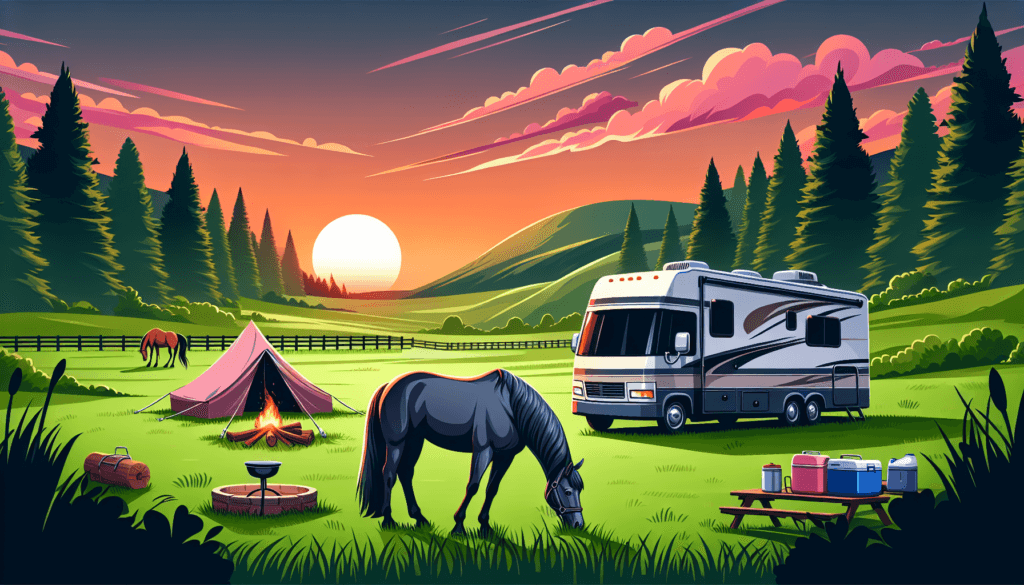
Managing Waste and Environmental Impact
Dispose of horse waste responsibly
Proper waste disposal is an important aspect of being a responsible equestrian RV camper. Dispose of horse waste in designated areas or follow campground guidelines for waste management. Portable manure bins or composting systems can be utilized to contain and manage horse waste during your RV camping trip. Avoid spreading manure in sensitive areas or leaving it behind at campsites, as it can impact the quality of the soil and water sources.
Minimize your carbon footprint while RV camping
Conscious efforts to minimize your carbon footprint can positively impact the environment while RV camping with horses. Practice energy conservation by using efficient appliances, turning off lights when not in use, and minimizing generator usage. Opt for environmentally friendly cleaning products and biodegradable waste bags. When possible, choose sustainable or recyclable materials for your horse care supplies and camping gear. Small changes can make a big difference in reducing your overall environmental impact.
Follow proper waste management rules at campgrounds
Responsible waste management is essential to maintain a clean and sustainable environment at campgrounds. Follow campground rules and regulations for waste disposal, recycling, and designated dump stations for RV waste. Separate recyclables from regular trash and dispose of them accordingly. Properly dispose of hazardous materials, such as batteries or chemicals, in designated hazardous waste collection points or recycling centers. By following these guidelines, you contribute to the preservation and cleanliness of the campground.
Respect and protect the natural habitat and wildlife
While enjoying the great outdoors, it’s important to respect and protect the natural habitat and wildlife you encounter. Stay on designated trails to minimize your impact on sensitive ecosystems. Avoid disturbing wildlife, including nesting areas or habitats. Keep a safe distance from any wildlife you encounter, refraining from feeding or approaching them. Immersing yourself in nature while minimizing your impact ensures its preservation for future generations to enjoy.
Leave campsites cleaner than you found them
A commitment to leave campsites cleaner than you found them is a hallmark of responsible RV camping practice. Before departing, thoroughly clean your campsite, removing all traces of your presence. Collect and dispose of any debris or litter, including microtrash, to keep the area pristine. If possible, participate in organized campground clean-up events or pick up any litter you encounter during your stay. Leaving a clean campsite demonstrates your respect for the environment and sets a positive example for future campers.
Connecting with Fellow Equestrian RV Campers
Join equestrian and RV camping communities
Connecting with like-minded individuals is a wonderful way to enhance your equestrian RV camping experience. Join online communities or forums dedicated to equestrian RV camping, where you can share tips, seek advice, and connect with fellow enthusiasts. These communities often provide a wealth of knowledge and resources to help you plan future trips, discover new destinations, and make lifelong friends within the equestrian RV camping community.
Participate in horse-related events and activities
Attending horse-related events and activities opens doors to new opportunities for connection and camaraderie among fellow equestrian RV campers. Look for local clinics, workshops, or trail riding events in the areas you plan to visit. Participate in organized trail rides or horse camping meetups, where you can socialize with other horse owners and share your RV camping experiences. These events foster a sense of community and provide unique opportunities to learn from and connect with others who share your passion for horses and RV camping.
Share tips and experiences with other horse campers
When engaging with fellow horse campers, take the opportunity to share your own tips and experiences. By sharing your knowledge and insights, you can help others navigate the challenges and joys of equestrian RV camping. Share your favorite camping spots, recommendations for horse-friendly facilities, or innovative solutions to common challenges. These exchanges of information contribute to a supportive and collaborative community, enriching the experience for all equestrian RV campers.
Build networks and friendships within the horse community
Equestrian RV camping provides a unique opportunity to build networks and friendships within the horse community. Take the time to connect with other horse owners, RV campers, and equestrian enthusiasts you encounter during your travels. Exchange contact information, establish connections on social media, or even plan future trips together. Building networks and friendships within the horse community not only enhances your travel experiences but also creates a support system of like-minded individuals who can offer advice, assistance, and lifelong friendships.
Exchange recommendations for horse-friendly campgrounds
As an equestrian RV camper, you have firsthand experience in exploring horse-friendly campgrounds. Exchange recommendations and reviews for horse-friendly campgrounds with fellow equestrian and RV camping communities. Share information about the amenities, facilities, and nearby attractions to help others make informed decisions for their own horse camping adventures. By exchanging recommendations, you contribute to the collective knowledge and ensure that horse lovers have access to exceptional camping experiences with their equine companions.
In conclusion, RV camping with horses can be a fulfilling and adventurous experience. Properly equipping yourself with essential equipment, choosing the right RV, selecting horse-friendly campgrounds, and taking steps to ensure the well-being of your horses are crucial for a successful and enjoyable journey. With careful planning, responsible practices, and a spirit of adventure, you can embark on a memorable equestrian RV camping adventure that strengthens your bond with your horses and creates lifelong memories. So, grab your RV, load up your horses, and get ready to explore the wonders of the great outdoors together!
